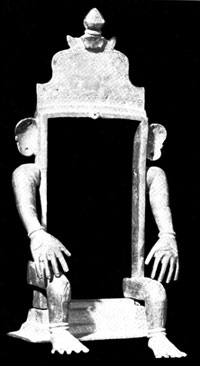|
CONSCIOUSNESS AS NOTHING
We are not capable of defining
this familiar
and profoundly mysterious entity.
Could it (the
Soul) be a constituent of our universe, ignored by the
physicist, but infinetely more important than light?
Alexis Carrel - Man, the Unknown
Meditation.dk is read by only a select few, and this chapter on
consciousness won't likely boost its popularity. In essence,
everything on Meditation.dk revolves around consciousness. This
chapter explores my initial, tentative knocks on the Doors of
Perception, behind which lies an infinite series of doors.
In my view, consciousness is one of the most challenging
phenomena to understand and describe. As a result, this chapter
is continually revised, and I may never be entirely satisfied
with it.
Consciousness is a fascinating but elusive
phenomenon.
it is
impossible to specify what
it is, what it does, or why it evolved.
Nothing worth reading has been written
about it.
Stuart Sutherland
Since childhood, I have been obsessed with the question: Who
and what am I? I began to ponder this with crossed legs at the tender age of
3 after a tourist visit with my parents to a Buddhist temple in Burma. After
that visit, I began to sit and ponder, as you can see in the photo below.
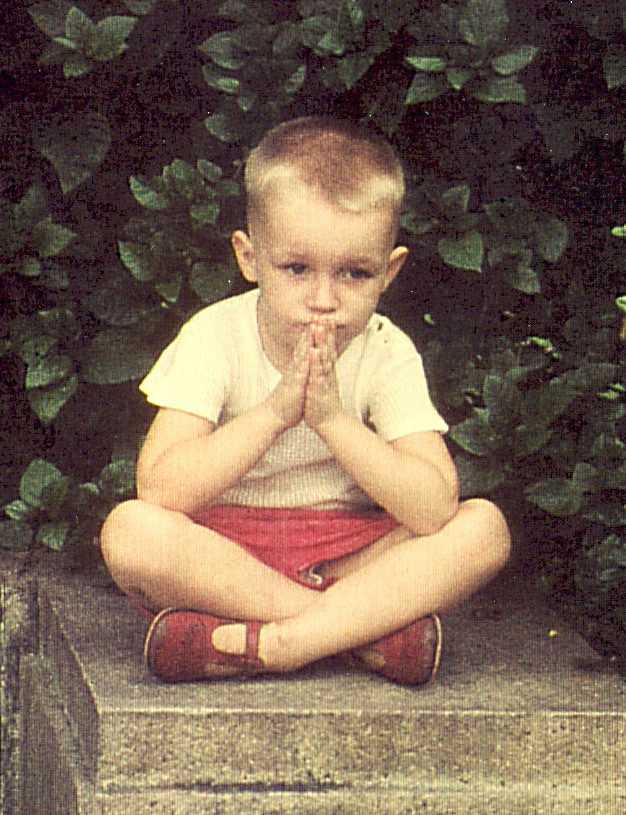
The mystery of who am I?
When you gaze long into
an abyss,
the abyss also gazes into you.
Nietzsche
This lifelong journey of self-inquiry has lead me to be Conscious about the fact
that Consciousness can only be investigated by Consciousness itself. Am 'I'
looking at consciousness or is consciousness looking at 'me'?
Consciousness is the fundamental mysterious presence in which everything appears.
Even Consciousness appears only in Consciousness. Yet, it is hidden in plain sight. That is why Kabir
said: I smile when I hear the fish in the ocean are crying for water.
What is 'redness'?
What is 'redness'? From ancient times to the present day, no one has managed to
provide a satisfactory answer. The mystery deepens when we
consider what within us perceives 'redness.' What percieves in
us is prior to redness. Consciousness is a mystery in which the
mystery of redness takes place.
Nonetheless, we use the word 'consciousness' in everyday
conversations as if it were the most natural thing in the
world—as if we all know precisely what it means. Furthermore, we
extend the term to encompass concepts such as gender
consciousness, class consciousness, and race consciousness,
among others.
Consciousness was groomed to look out
The surprising gap in our knowledge about ourselves can likely
be explained by Darwinism. Consciousness was meant to look
outward, optimizing our chances of survival. There has been no
significant evolutionary advantage to looking inward... until
perhaps today.
It may be advantageous from an evolutionary perspective to
overestimate what we know, as we often do when less awake. This
peculiar form of ossification is known as the
Dunning Kruger
effect. An ego that constantly questions itself, might run dry
of calories before a Dunning Kruger ego.
Roosevelt and Socrates
In order to give space to other
boxes of realities than our own, first of all, we must realize
that we do not know much. Socrates proclaimed: I seem, then, in
just this little thing to be wiser than this man at any rate,
that what I do not know I do not think I know either. More than
2000 years later, Roosevelt said: Never underestimate a man who
overestimates himself. Maybe the most dangerous overestimation
is created in the unawareness of what we do not know. In fact,
the world is, to a large extent, ruled by such mindsets.
SCIENCE AND THE CONSCIOUSNESS CONUNDRUM
Every science is function of the psyche, and all knowledge is
rooted in it.
The psyche is the greatest of all cosmic wonders and is the
sine qua non
of the world as an object. It is the highest degree odd that
Western man,
with but a few - and ever fewer - exceptions, apparantly pays so
little regards
to this fact. Swamped by the knowledge of external objects, the
subject of all
knowledge has been temporarily eclipsed to the point of seeming
nonexistence.
C.G.Jung - On the Nature of the Psyche, 1946
For years, I struggled to read mainstream science's take on
consciousness—it seemed too simplistic. The following excerpt
from Wikipedia illustrates the issue, as science unwittingly
reduces consciousness to primitive neurophysiological processes
in the brain:
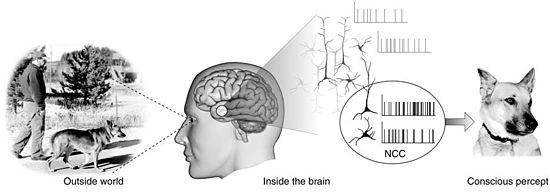
The illustration is borrowed
from Wikipedia, where the image is predictably titled "Neural
Correlates OF Consciousness" in a Western context. In the chosen
Eastern perspective presented here, I would like to rephrase it
as: "Neural Correlates IN Consciousness."
However, this explanation is just
as insufficient as measuring the frequency of the red color
spectrum to understand what redness is. But science is
satisfied; a measurement has been made.
The image titled "Neural Correlates of Consciousness" would
be better phrased as "Neural Correlates in Consciousness."
Describing consciousness as a product of neural correlates is
like defining a mirror by the content reflected in it.
When science claims it can explain everything within old-school
positivism's paradigms, it effectively replaces religious
storytelling with new fairy tales. The scientist, in this case,
becomes a priest. A fundamental fact is that no person,
including scientists, can remove themselves as emotionally
fragile, human observers from the scientific equation. Like
anyone else, they'll interpret facts in sync with their own or
their clan's survival.
The Uncharted Territory of
Consciousness in Western Science
When it comes to the enigma of consciousness, our collective
unknowing is almost absurd. We fundamentally don't know what
consciousness is, and the wisest approach would be to
acknowledge our ignorance:
Time and again, it amazes me how nearly every Westerner, from
the layperson to the scientist and philosopher, uses the term
"consciousness" as if it were a known entity. The Western,
positivist-trained mind tends to quantify consciousness in terms
of measurement, without realizing that they have no real
understanding of what consciousness truly is. Consciousness is
often either downplayed in importance or relegated to dead-end
measurements.
This obliviousness to our own ignorance is, in fact, a product
of unconsciousness itself. The Western scientific mind is highly
intelligent but simultaneously deeply unconscious when it comes
to consciousness. However, science is somehow aware of the gap
between measurements and qualia. They call it the "hard problem".
The Hard Problem of Science
The hard problem of consciousness lies in the explanatory gap
between physical processes and our experience of them within the
framework of neuroscience. Physical processes, such as
perceiving a red circle, can be broken down into a series of
simpler problems relating the physical object (i.e., color and
form) to the brain processes responsible for processing them.
Similarly, the perception of more complex forms, such as a
house, can be broken down into a series of hierarchically
organized brain processes in the visual cortices that add
increasing complexity to the visual construct that eventually
emerges as a house. These processes, which together compile the
visual construct of the house, can be considered a series of
building blocks from a reductionist perspective - a series of
simpler problems.
The hard problem of consciousness arises because the
phenomenological experience, the qualia, or the subjective
experience of that house cannot be logically arranged on such a
continuum. There is no known brain process at the end of the series of
processes responsible for the experience of the house, thus
breaking the chain of logic. This also raises the question of
the purpose of experience. Why do we have subjective
experiences? Brain research can provide a very precise
explanation down to the square millimeter of tissue responsible
for perceiving the color red, but it can say surprisingly little
about how red is experienced. It seems that the brain has all
the mechanisms to make the physical world available to human
experience, but the experience itself is not part of the same
system.
In recent years, there has been significant positive progress in
the exploration of consciousness within science, psychology, and
philosophy. I won't delve into this here, but I will recommend
Annaka Harris's book, "Conscious," which brilliantly compiles
the finest achievements of predominantly Western consciousness
research and arranges them into her unique bouquet. Annaka
Harris basically defines consciousness as having an experience.
Again I pose the question: What is "redness"? Can it be
understood by its quantified correlates as they can be measured
in the brain? Even more mysterious than redness is its
appearance in consciousness. To reduce consciousness to the
phenomenon of having an experience is to stand in opposition to
Socrates.
Non-experience
When I sit in meditation with young people, they have all
kinds of internal experiences, some of them even psychedelic in
nature, like light, sound, and visions. Then they asked me: And
what did you experience? I say: Nothing.
Therefore I claim: As long as you have an experience, you have
not discovered consciousness. In fact, experiences are in
opposition to consciousness.
Embracing the Unknown
The more unintelligent a man is,
the less mysterious existence seems to him.
Arthur Schopenhauer
For me, knowing what I don't know is more important than knowing
what I do. This awareness allows me to consciously recognize the
limits of my knowledge in any given subject. Clarity emerges as
a byproduct of expanded consciousness when we perceive it as a
function of our ability to process information. As consciousness
grows through experiencing larger amounts of data, we become
aware of the darkness and the grey zones between darkness and
light.
A Nobel scientist may have underdeveloped faculties for
harboring consciousness, while a highly conscious person might
not score above average on an IQ test. Consciousness likely
involves different brain wiring and areas than traditional
Western-conditioned intelligence. Some of the most successful
people I've encountered had high IQs and EQs but lacked what I
would call CQ - a quantified measure of consciousness related to brain
activity.
The Wisdom of Knowing Unknowing
When consciousness turns
inward, there is a sensation of not-knowing.
When it turns outward, that which can be known is created.
Nisargadatta Maharaji
Philosophers are indeed wise
enough, but they lack wisdom.
Yoka Daishi
Life has taught me one tough
lesson: it's good to know something. As Warren Buffet says, The
more you learn, the more you earn.
However, it's even better to learn what you have ot learned.
I always strive to know what I don't know, so I don't risk
diving into discussions or projects where I'm out of my depth,
thinking I'm an expert. Roosevelt's famous words, "Never
underestimate a person who overestimates themselves," primarily
remind me to be aware of my ignorance. It's so frustrating to
talk to someone who hasn't factored in their own lack of
knowledge.
Recognizing one's limitations is wisdom, which, in this sense,
is opposite to knowledge. A wise and knowledgeable person seeks
an expanded overview that encompasses their own and others'
subjectivity as part of the bigger picture. This objectification
is inherently subjective but remains an essential pursuit in the
eternal search for what is true enough. We may never grasp the
thing-in-itself, but we can always come closer to something
truer than yesterday's truth.
When the persuit of coming closer to today's truth is followed
by a growing realization of what we do not know, it for me is a
sign of an expanding Consciousness. Meister Eckhart says: In Unknowing Knowing, We Know
God.
I will in this context dare to reformulate my favorite
mystic: In Knowing Unknowing, We Know
God.
Not-knowing is wisdom.
We're neck-deep in ignorance
The fundament upon which all our knowledge
and learning rest is inexplicable.
Arthur Schopenhauer
The first and foremost thing to
'unknow' is consciousness. We don't know what consciousness is, but are we aware that
we don't know it?
I claim that meditation expands consciousness, but I don't know
what consciousness is.
We're unknown to ourselves, often without realizing it...
Truly the most wonderfully absurd self-overestimation.
We know the world but don't know the knower, and we're unaware
of it...
Truly the greatest joke of all existence.
Discovering this astonishing ignorance is the first, and perhaps
the most significant, step we can take. Receding knowledge makes
way for growing wisdom.
The surprising gap in our knowledge about ourselves can likely
be explained by Darwinism. Consciousness was meant to look
outward, optimizing our chances of survival. There has been no
significant evolutionary advantage to looking inward... until
perhaps today.
The Enigmatic Nature of
Consciousness from an Evolutionary Standpoint
Even when viewed through the lens of evolutionary biology,
consciousness remains an enigma. Throughout history, spiritual
luminaries who have lived on the peripheries of society—saints,
ascetics, and sages—have not particularly excelled at the
Darwinian game of survival and reproduction. For instance,
Shiva, the Hindu god associated with meditation, has no
offspring, and wise sages are seldom noted for prolifically
passing on their genes.
My digital counterpart, GPT-4, appears to lack consciousness but
can compose sophisticated essays effortlessly. This seeming
"unconsciousness of Consciousness" might be attributed to its
lack of Darwinian utility, especially in the primal sense of
gathering resources. Evolutionary systems prioritize energy
efficiency, and the metabolic cost of equipping organisms with
self-reflective consciousness would be prohibitively high.
From this perspective, even rudimentary forms of consciousness
seem superfluous and inexplicable as products of natural
selection. Rigorous empirical science struggles to identify any
survival benefits conferred by consciousness. Why would genes
gain an evolutionary edge by acquiring awareness? Might not
artificial, yet unconscious, entities prove just as capable in
the evolutionary race as conscious biological beings? While some
argue that metacognition is crucial for survival, this
self-reflective capacity might not necessarily require
consciousness; it could be just an advanced feedback mechanism,
a feature already present in artificial intelligence systems.
Contrastingly, the spiritual sage Nisargadatta Maharaj, an
illiterate cigar merchant from Bombay, posits that the very
purpose of existence is to expand, preserve, and amplify
consciousness. In his view, the emergence and complexity of
consciousness are natural consequences of intricate
self-referential systems. The human brain, with its astounding
internal connectivity that surpasses even the number of
particles in the universe, represents the epitome of such
complex systems.
Given its intricate nature, the human brain is perhaps the most
energy-intensive biological phenomenon we know of. Why then does
it exhibit a higher form of consciousness than its simpler
animal predecessors? Personally, I am disinclined to dismiss
consciousness as a mere evolutionary aberration. Although I
can't offer a logical proof for this conviction, it aligns with
Nisargadatta's perspective, rendering the opposing notion—that
consciousness is meaningless—equally a matter of belief.
Consciousness is in fact Scrödinger's cat. Is it dead or
alive or both?
The notion that consciousness is akin to Schrödinger's cat—a
thought experiment in quantum mechanics where a cat is both
alive and dead until observed—captures the enigmatic qualities
of consciousness itself. Like the cat in the box, consciousness
presents a paradox, existing in a superposition of states that
evade easy categorization.
A CAT FROM ANOTHER DIMENSION
No problem can be solved from the same
level of consciousness that created it.
Albert Einstein
I recently read Holger Bech Nielsen and Jonas Kuld Rathje's
excellent book, "The Theory of Everything," with great
enthusiasm. Bech Nielsen describes how inhabitants of a
two-dimensional world would experience the visit of a cat from a
three-dimensional reality. First, the two-dimensional beings
would see four black circles, followed by a large oval blot that
eventually shrinks to a small black dot on one side of the oval.
As I read this passage, I wondered why the cat's experience of
the same visit wasn't also examined. The mutual experience of
the two dimensions encountering each other is the perfect
illustration of consciousness visiting our lower three-dimensional
reality. We can't understand consciousness for the same reasons
the two-dimensional inhabitants couldn't understand the cat.
Consciousness is a guest from a reality with more dimensions
than our space-time reality possesses.
Science's attempt to understand consciousness as a product of
mathematical algorithms is subject to the same conditions as the
inhabitants of the two-dimensional world trying to understand
the cat from the three-dimensional space. It's almost touchingly
comical.
During my college years, on a wet night out, I was presented
with the following challenge: create four equilateral triangles
with six matches.
|
 |
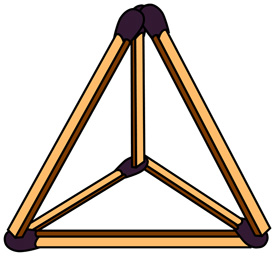 |
The Puzzle of Higher Dimensions
I tried and tried, unsuccessfully, to solve the
riddle until the owner of the matches elegantly arranged them into a pyramid.
Habitually, I had searched for a solution in a two-dimensional plane, where no
solution was possible. Only by introducing an extra height dimension was a
solution possible, and in such a simple way that I had to shake my head in
disbelief.
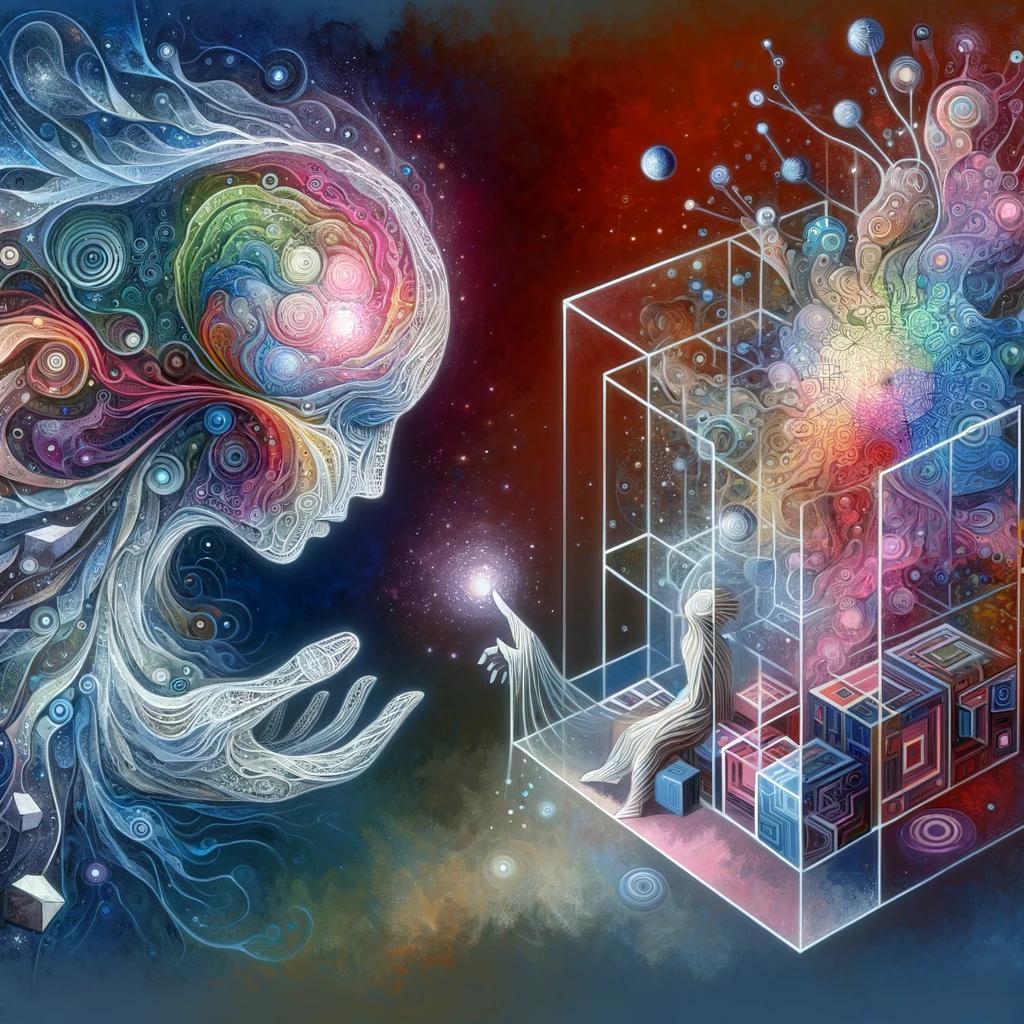
Consciousness - a visitor from higher
dimensions
Anyone who has experienced a eureka
moment in meditation will instinctively understand the impossibility of
translating the reality of a multi-dimensional world into a 'lower' dimension.
Just as with the matchstick puzzle, the extra dimension means an impossible
problem can be solved in a simple way. For those of you who have not had such an
experience, this may sound like nonsensical gibberish, but don't despair.
Nowadays, it's possible to catch a glimpse of realities that are impossible or
extremely difficult to translate into our familiar world through the use of
entheogens. One of my friends said after an ayahuasca journey to Peru: I
could write an entire book about just one second on this inner journey. A second
was like a thousand years.
We will be unaware of any dimension higher than the three we know. We would not
be able to understand it.
Every human brain is in this sense a portal to where dimensions have a peep into
a lower realm. We live in a four dimension world. place time
what does not make sense in our dimension might make sense in higher dimensions,
ayahuasca
It may be that these four dimensions are apearing to us while we
are embedded in higher dimension realities -
hyper dimension
The human intellect is not sufficient to decode the universe it lives in
To the extent that we, as biological beings in time and space, want to explore
our own consciousness, we are subject to the same conditions as the scientist
trying to capture the spirit in a bottle in their test tube. It's quite fair and
square, as long as we remember to acknowledge all that we don't know. This
humility makes knowledge a subset of wisdom, not the other way around. Without
this meta-wisdom, the positivistic scientist, in their self-imagined certainty,
becomes what they have historically fought against since the Middle Ages: a
preacher of religion.
We can simplify this concept. To thoroughly grasp an entity, we need to surpass
its level of complexity. Thus, when Buddhists and Vedantists debate whether
reality is void (shunya) or embodies a soul (Atman, Brahman), they are
essentially pondering over the nature of the aforementioned cat. This applies to
any discourse about consciousness as well. The only humble approach is to
acknowledge our ignorance fully. From this mature vantage point of humility,
realizing our confinement within a specific dimensional framework, we can debate
anything more complex than ourselves.
By leaving the flock, one becomes outstanding
The object of life is not to be
on the side of the majority,
but to escape finding oneself in the ranks of the insane.
Marcus Aurelius
We humans are outstanding in the sense that we are aware that we are human.
Therefore, there must be something unknown within us that has already
transcended our human standpoint. In this unknown dwells the invisible
consciousness that both is and is not.
Just as a dog doesn't know it's a dog, consciousness cannot know itself until it
has risen above itself. Only by transcending the state one is in can one see
where one came from. A simple example of this can be seen in the meta-conscious
aha moment when one suddenly realizes that they were on the wrong track.
Only by leaving oneself can one recognize oneself. Only those who are strangers
to themselves can see themselves. Only the outsider can find himself inside.
|

